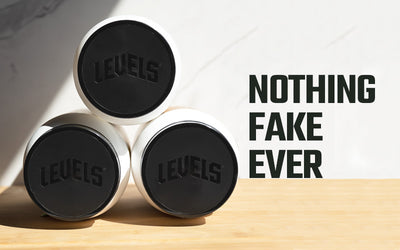Protein is one of the essential building blocks in any health or fitness routine. It’s not only an essential nutrient for your body’s tissue, organs, and hormones, but it’s also an energy fuel source driving muscle growth and maintenance. It can be used to satiate hunger and supplement nutritional gaps in your diet. So whether you’re looking to see some gains in the gym or cutting weight, it’s important to get a good sense of how much protein you should intake to reach your goals.
What’s the ideal amount of protein you should consume?
The answer is...it all depends. Your weight, lifestyle, and goals are all determining factors in your recommended daily protein intake. The current Recommended Daily Allowance (RDA) for protein is 0.8g per kg of body weight for those leading more sedentary lifestyles [* , *]. If you’re using the Imperial System (those living in the United States), you’re looking for 0.36 grams of protein for every 1 pound of body weight. Typically, if you’re working in an office or similar job that has you sitting for long periods of time each day, you would fall into the sedentary lifestyle group. For this reason, it’s important, to be honest about your total level of activity each day when calculating your desired protein intake.
If you’re an active individual or an athlete, increases in muscle mass, sweat loss during activity, and muscle recovery and repair post-workout are all supplemented by an increase of protein in your diet [*]. Several studies recommend daily amounts of protein from 1.2-1.4g per kg of body weight for endurance training and 1.6-1.8g/kg for strength training [*]. This is because active individuals are burning more energy, and they require more intake for both functioning during workouts and aiding in the recovery from them. If you’re athletic or active the Recommended Daily Allowance will not be sufficient to help build muscle and provide the results you want.
If your goal is to lose weight, increasing the amount of protein you intake could help you lose fat, by preserving more lean mass. This is the idea behind the popular low-carb, high-protein diet, Keto. When on these diets it’s important to make sure you’re still getting enough fat, carbohydrates, fiber, vitamins, and minerals that your body requires to perform.
How should I use the daily protein intake calculator?
Since we aren’t taking in-person physical measurements, our protein intake calculator won’t provide a true scientific result, but it can provide the best estimate of where to start! The calculator takes into account several factors to determine the best-estimated protein intake to achieve your fitness goal. Since everyone’s body is different, experimentation is encouraged. Start with the output provided by the calculator, try it for a few weeks and see how you feel. You can always adjust your protein level based on what amount you feel works best for you.
What are the best sources to get protein?
The importance of protein to humans comes from amino acids, especially the nine essential amino acids humans obtain in their food. The best sources of these are whole foods, meats, dairy, fish, eggs, grains, legumes, and nuts. High protein foods contain different amino-acid profiles, so introducing variety into your diet is important. Eating boiled chicken breasts 4 times a day is “healthy” (air quotes), but you’d be depriving yourself of more balanced nutrition in the long run.
If you’re finding it difficult to get enough protein in your diet, these gaps can be filled by nutritional supplements like whey protein. If you’re looking for delicious ways to sneak protein into your daily routine, we’ve highlighted a few of our favorite recipes like these muffins, or cottage cheese fruit bowls.
Just a few last reminders on the effects protein has on your health and diet. First, high-protein foods are typically lower in fiber content, so remember that you’ll need to increase your intake of foods high in fiber like kale, asparagus, or broccoli. These will help keep your insides running smoothly. Additionally, if you’re lactose intolerant or vegan, there are additional plant-based sources of protein and supplements for you to use as an alternative to dairy or animal products.







